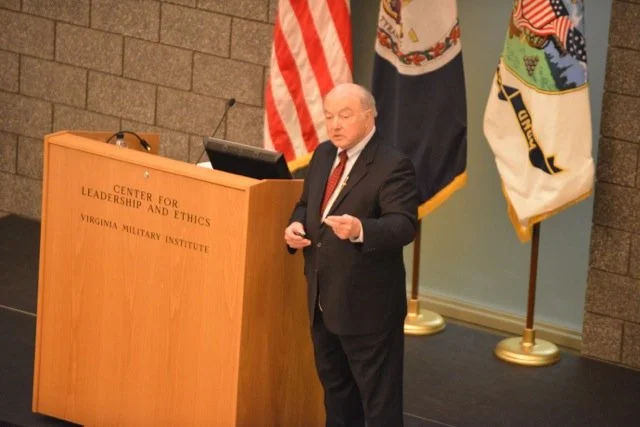VMI Conference on Reagan Sheds Old Light on New Issues
By Joe Beeby During his time as president, Ronald Reagan faced a tumultuous Middle East along with a belligerent Soviet Union. Thirty years later, America continues to face similar issues. Because these issues are inherited – their roots trace back even before the 1980s – we must continually consider the past when examining our contemporary foreign policy.
Several weeks ago, VMI hosted a conference on this exact topic. The event, called “The Enduring Legacy: Leadership and National Security Affairs During the Ronald Reagan Era,” boasted a variety of highly distinguished speakers. Ambassadors, military officers, national security staff, and academics alike spoke on a wide range of topics. Former Ambassador to the Soviet Union Jack Matlock and former NATO commander Admiral James Stavridis delivered keynote addresses over the course of the two-day event. All speakers provided insightful knowledge on the foreign policy of the 1980s ranging from discussion of nuclear weapons to that of Reagan’s speaking abilities. Each speaker advocated a different aspect of the American leadership at the time as having the most important role in end of the Cold War. Frankly, the factors that culminated in that end are numerous. But the most compelling of these arguments came from Ambassador Matlock. As U.S. Ambassador to Czechoslovakia, then Special Assistant to the President for National Security Affairs and later U.S. Ambassador to the Soviet Union, Matlock acted as a key player in the final decade of the USSR. Throughout his talk, Ambassador Matlock argued the importance of personal relationships in international affairs. Specifically, he pointed to the close friendship between Ronald Reagan and Mikhail Gorbachev as the most crucial aspect to American diplomacy. Matlock participated in this old school manner of global politics – and he saw great success. Such personal diplomacy between Reagan and Gorbachev heavily contributed to the peaceful end of the Cold War. Unfortunately, this type of activity proves hard to measure and evaluate since so much of it is never recorded. We thus must trust the accounts from people who were there. And Ambassador Matlock certainly was there.
I spoke with Brigadier General Charles Brower, a Professor at VMI and panel speaker at the conference, who summed up Matlock’s point eloquently. Brower said, “It was a human chemistry that they clearly nurtured and which facilitated their joint resolution of a Cold War that few people ever thought would end.” Truly this is the most valuable lesson we can glean from the final years of the Cold War. Overwhelming force was never used, and indeed, it was never required. Rather, Gorbachev and Reagan were able to guide the failing communist system to a soft crash landing with respect and trust for each other.
The conference provided excellent historical and technical accounts of specific details of the Cold War. One panelist focused solely on nuclear weapons. Others restricted their topics to single countries of interest. But this idea of Ambassador Matlock’s remained woven through nearly all discussions. Personal relationships are the real heart of diplomacy. Matlock stressed the importance of learning and appreciating your allies’ (and enemies’) language and culture. At the risk of sounding too idealistic, I believe many international conflicts would dissolve if only leaders would learn some appreciation for their neighbors’ cultures. This is what President Reagan did, and it is something we should try to emulate. We cannot expect all national leaders to do this, but we can hold our own leaders to this standard. Perhaps it is time to give old school diplomacy another try.
Photo credit: Kelly Nye, VMI


